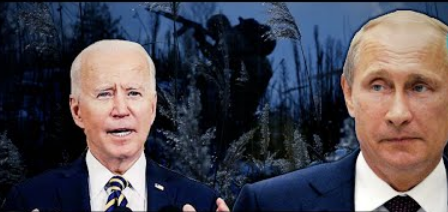Photos: YouTube
The escalating conflict between Russia and Ukraine captures the attention, and fear, of the world. Russia is claiming their invasion is in response to the European Union and NATO’s expansion, among other things.
Retired Economics Professor Richard Wolff is now pointing out that this national security narrative is something that the U.S. has used without credible evidence multiple times in the past 20 years, including Iraq and Afghanistan. But what is driving America’s politics on Ukraine and Russia today?
Professor Wolff is sharing the background of the U.S. approach & possible impacts of this situation on our global economy.
“I will not repeat what you can find in the mass media who are whipping up pretty much a hysteria around this issue, but I will try to shed light that you might not have otherwise seen,” said Wolff. “The origin of all of this has much more to do with domestic politics and since I’m an economist, domestic economics than anything else.”
Biden’s administration has suffered a series of defeats including Build Back Better, an ongoing pandemic and a rising inflation. Wolff warns that drum-beating in global conflict most certainly has a hidden, domestic agenda.
“Many times in U.S. history, as in that of other countries, nothing works to distract attention so much as a nice, scary, foreign kerfuffle, and that’s what the Ukraine in large part, not all but in large part, is about,” Wolff adds.
On top of this, Russia is one of the biggest exporters of gas and oil. Be ready for the U.S. to “use this struggle to squeeze the Russians out of the European energy market and the Americans in.” Europeans don’t want war on their continent, but the U.S. would have an interest in such a policy. Although politically, Wolff warns the support will be as long-lasting as a pep rally.
The U.S. has announced more sanctions on Russia (than already existed) as a first response. Wolff warns all of us in the U.S. that sanctions have not worked well to deter countries like Russia and China in the past. “They are not the deterrent. It may be a good couple of days on television looking and sounding tough, but it doesn’t do the job.”
The largest effect of these sanctions will be a sharp rise in inflation, to the detriment of workers in the U.S. Capitalists around the world will use this turmoil as an excuse to boost prices (and their profits). After an economic crash and health disaster, sanctions will “worsen and lengthen the inflation already shaking the U.S. capitalist system to its foundations.” Capitalism has backed itself into a dead end and war will only make things worse.
“The inflation is going to be the first global casualty of the events in the Ukraine,” said Wolff.
Finally, we all fear outright military conflict. Wolff shares this worry that you’re feeling now.
We will have to ask ourselves in America a simple question:
“Is whatever happens in the Ukraine worth a war? Really? In the nuclear age? Now, with all the problems the United States has? I don’t think so, and I don’t think the American people any more than the Europeans will go for that,” Wolff said. “That is the reality behind the hysteria, and I hope that these considerations will add something as each of you think about and deal with the risks we all face as this plays itself out.”
We hope this has given you some concrete realities during this reactionary media week. Democracy at Work will continue to cover this and offer what knowledge we can.







